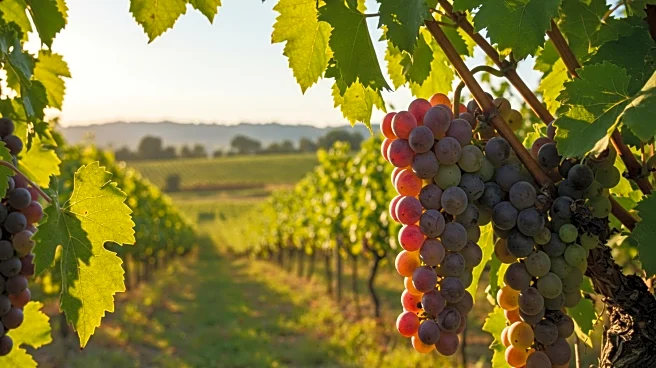What's Happening?
The Champagne region in France has commenced its official grape harvest, with producers expressing optimism about the yield due to favorable weather conditions. The harvest, which includes varieties such as Chardonnay, Pinot Noir, and Meunier, is starting earlier than usual due to high temperatures. The Comite Champagne industry association has noted a rapid increase in alcohol content, indicating a potentially excellent vintage. Despite this positive outlook, the industry faces challenges, including U.S. tariffs affecting exports and a reduction in grape usage by 10% due to economic uncertainties. Additionally, the industry is under scrutiny following charges against individuals for trafficking seasonal workers and housing them in poor conditions.
Why It's Important?
The Champagne industry's harvest is crucial as it impacts both local and international markets, particularly the U.S., which accounts for a significant portion of its sales. The reduction in grape usage reflects broader economic concerns, potentially affecting supply and pricing. The scrutiny over labor practices highlights ongoing ethical issues within the industry, which could lead to regulatory changes and impact the reputation of Champagne producers. The combination of a promising yield and economic challenges underscores the delicate balance the industry must maintain to ensure profitability and ethical compliance.
What's Next?
The industry will continue to monitor the impact of U.S. tariffs and economic conditions on its operations. The upcoming trial in November regarding labor practices may lead to increased regulatory oversight and changes in how seasonal workers are managed. Producers will also focus on maximizing the quality of the harvest to mitigate economic pressures. Stakeholders, including wine growers and international buyers, will be watching these developments closely to assess future market conditions and potential shifts in trade policies.
Beyond the Headlines
The Champagne industry's situation highlights broader issues of climate change, as warmer temperatures affect agricultural schedules and yields. The ethical concerns regarding labor practices may prompt a reevaluation of industry standards and worker rights, potentially influencing other sectors reliant on seasonal labor. The economic uncertainties faced by the industry could serve as a case study for other agricultural sectors navigating similar challenges.










